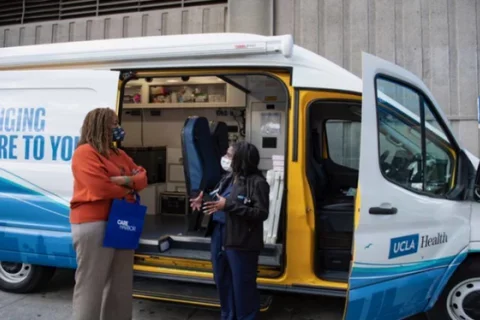UCLA Health Homeless Healthcare Collaborative joins Care Harbor clinic

200-plus volunteers from UCLA Health will staff the annual clinic, which provides medical services to underserved populations
COVID-19 has battered the health care system and economy for two years and has greatly exacerbated health inequities – putting families at risk for losing their jobs, health insurance and lives. Today, about 3.2 million Californians are uninsured.
It’s a gap the annual Care Harbor clinic works to close.
The free, volunteer-based clinic will take place Friday through Sunday, March 4-6 at The Reef in downtown Los Angeles. The clinic staff is made up of more than 200 volunteers from UCLA Health, including internal medicine physicians, dentists, optometrists, ophthalmologists, nurses and students.
“Due to the pandemic, many people experienced delays in seeking health care services,” says Yelba Castellon-Lopez, MD, MS, assistant clinical professor of family medicine at the David Geffen School of Medicine at UCLA. “Events like Care Harbor can play an important role in linking people who experience barriers to care to much needed social services, dental, vision and medical care.”
“Care Harbor is an opportunity to meet a need for some of our most vulnerable communities in Los Angeles,” she says.
A 2020 California Health Interview Survey found that of Latinos who delayed or skipped necessary medical care during the pandemic, 40% did so due to cost, lack of insurance and other insurance-related reasons. The survey also showed a decrease in dental visits among all Californians from 2019 to 2020.
UCLA Health is a presenting sponsor of Care Harbor and has been involved with the clinic since its inception in 2010.
Margarita Gonzalez, manager of the Center for Community Outreach and Policy at the UCLA Stein Eye Institute, has been involved with Care Harbor each year since it came to Los Angeles. “The UCLA Mobile Eye Clinic was invited to participate by the organizers of the event and we have continued to participate since then.”
Visitor to the clinic receive care for myriad conditions, from toothaches and vision issues, to immunizations, mental health counseling and more.
“We provide general primary care services and treat common musculoskeletal ailments, skin eruptions and other common infections. We have also newly diagnosed participants with diabetes or high blood pressure,” says Dr. Castellon-Lopez.
“Care Harbor and UCLA Health work really hard to collaborate with local community clinics and other Los Angeles County resources to link patients to regular sources of care so they can receive the follow-up care they need,” she says.
New to this year’s Care Harbor is the UCLA Health Homeless Healthcare Collaborative mobile clinic, which will showcase the services provided to unhoused people throughout Los Angeles.
Medically equipped vans staffed by doctors, nurses and social workers took to the streets in January 2022, providing primary and urgent care in West Los Angeles, Downtown, South Los Angeles and North Hollywood areas.
“It is our hope that by creating this durable structure, we can play a significant role in improving the lives of so many people who too often fall between the cracks,” said Johnese Spisso, president of UCLA Health, CEO of the UCLA Hospital System, and associate vice chancellor of UCLA Health Sciences. “At UCLA Health, we see first-hand the detrimental health consequences that can be brought on by homelessness.”
There are about 160,000 Californians experiencing homelessness, with more than 66,000 people in Los Angeles County.
According to an issue brief by the California Health Care Foundation, people who are homeless have higher rates of illness and on average die 12 years sooner than the general U.S. population. Chronic conditions such as heart disease, respiratory tract conditions, diabetes and HIV/AIDS are found at high rates among the unhoused population.
Additionally, people experiencing homelessness who contract COVID-19 are two to four times more likely to require critical care than the general population and two to three times more likely to die.
Because this population lacks regular access to health care, they are more vulnerable to worsening health outcomes.
UCLA Health data show that 85% of emergency department visits for people experiencing homelessness are due to preventable primary or urgent care conditions.
The UCLA Health Homeless Healthcare Collaborative provides medical screenings, preventive care and vaccinations, primary care, urgent care, continuity of care for chronic conditions, primary psychiatric care and referrals for housing and social services.
“Our goal is to alleviate homelessness by doing what we can to ensure every person has access to the medical care they need,” says Brian Zunner-Keating, MS, RN, director of the UCLA Health Homeless Healthcare Collaborative.
Learn more about the UCLA Health Homeless Healthcare Collaborative.



